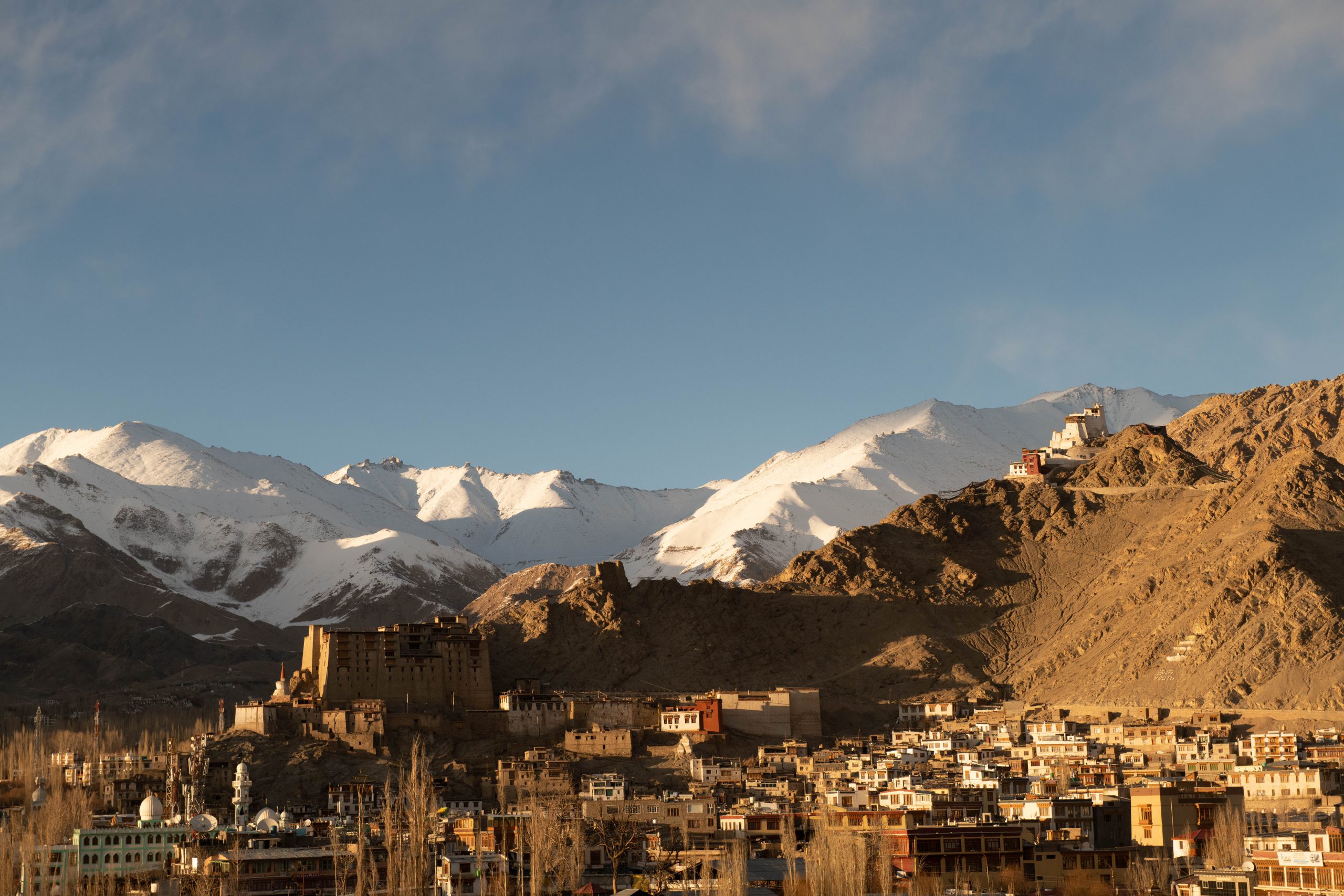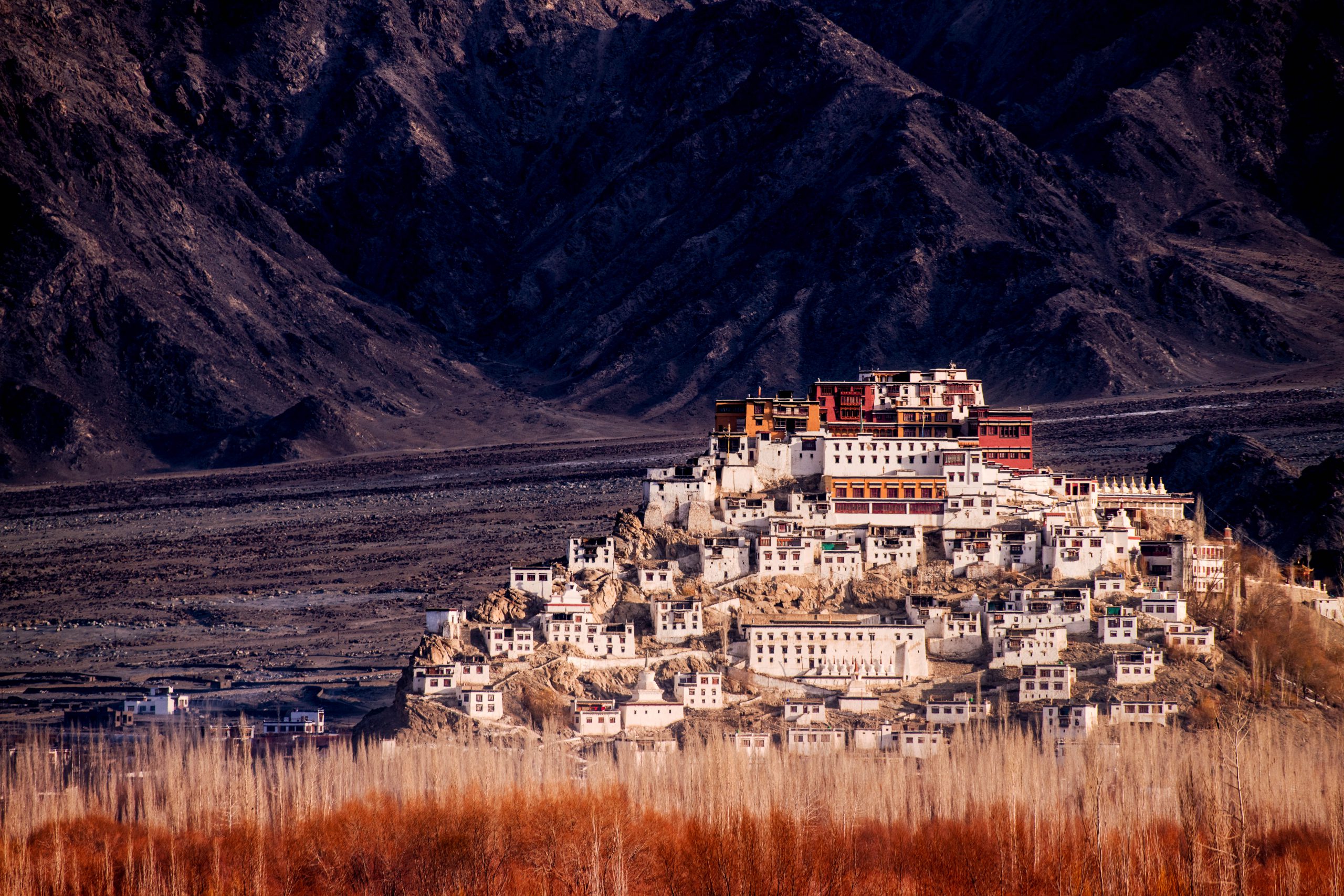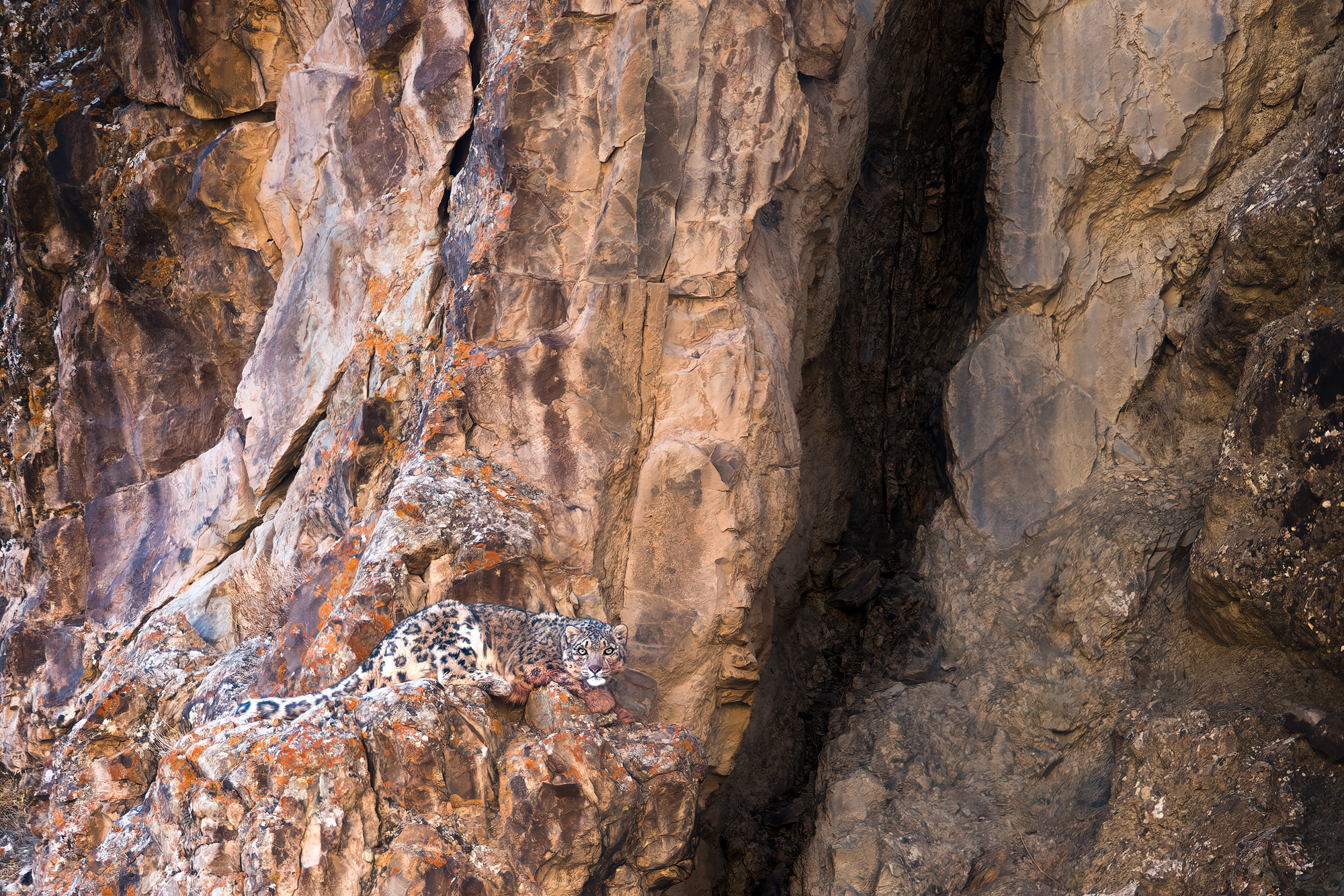Remote Mountainscapes of Ladakh, India
Snow Leopards
February 11 to 25, 2025
Safari Overview
Join Our Waitlist Today!
Be the first to know if spots become available for this sold-out trip. By signing up, you’ll also receive notifications about our next exciting adventure to this destination when it’s organized and posted on our website. Secure your place in line for the adventure of a lifetime with Cheesemans’ Ecology Safaris!
Search for the elusive snow leopard in the incredible Trans-Himalayan mountains of Ladakh, India. Ladakh, a former Buddhist kingdom, is a beautiful mix of amazing landscapes, isolated Tibetan Buddhist monasteries, and huge mountain passes. It is also an ideal landscape for the snow leopard. You’ll search for this ultimate mountain predator that is built to blend into treacherous terrain while hunting for ibex and blue sheep. You’ll also look for Tibetan wolf, Eurasian lynx, ibex, blue sheep, Tibetan argali, and dozens of rare bird species. Visit an incredible, medieval Tibetan Buddhist monastery to get a perspective on life in the high Himalayas, and experience luxury camping in a remote valley with very high snow leopard traffic. Join the region’s best trackers to search for these ghosts of the mountains.
HIGHLIGHTS
- Search for the elusive snow leopard with the world’s best tracking teams.
- 7 nights in Hemis National Park, with the world’s highest concentration of snow leopards.
- Experience Himalayan culture and visit incredible Tibetan monasteries.
SAFARI OPTIONS
- Continue your journey on our India trip from February 23 to March 14, 2025. Journey to famous national parks, see magnificent tigers, and explore cultural highlights like the Taj Mahal.
NOTABLE EXPERIENCES
Updated: March 2024

Print Trip Safari Options
| Date | Description | Lodge | Meals |
|---|---|---|---|
| Feb 11–12 | Travel to Delhi, India. | ||
| Feb 13 | Arrive in Delhi. | Roseate House Hotel, Delhi | |
| Feb 14 | Fly to Leh early in the morning and begin acclimatization. | Grand Dragon Hotel, Leh | B, L, D |
| Feb 15 | Early morning visit to Tibetan Buddhist monastery of Thiksey. Spend afternoon acclimatizing. | Grand Dragon Hotel, Leh | B, L, D |
| Feb 16 | Transfer to your remote camp. | LungMār Camp, Hemis National Park | B, L, D |
| Feb 17–22 | Six full days of snow leopard spotting in and around camp. | LungMār Camp, Hemis National Park | B, L, D |
| Feb 23 | Transfer to Leh and fly to Delhi. | Roseate House Hotel, Delhi | B |
| Feb 24 | Continue on our India trip or depart for home. | ||
| Feb 25 | Arrive home. |
Our Trip Leaders
![]() Rigzin Chhosdol
Rigzin Chhosdol
Rigzin is from Gya, one of Ladakh's oldest settlements. She's an accomplished mountaineer and ABV Indian Institute of Mountaineering graduate, winning "Best Mountaineer" twice. Rigzin has worked on community-based conservation for years, protecting snow leopards, wolves, and other predators. As a field guide and camp coordinator, she leads snow leopard trips for six months annually, educating guests on Ladakhi culture and Trans-Himalayan wildlife. Rigzin's also active in the Youth Association of Gya and Miru, supporting education and environmental causes in her village.
![]() Abdul Rashid
Abdul Rashid
Rashid is a Himalayan expert skilled in mountaineering, photography, and snow leopard conservation. He's from Nubra Valley and is proficient in 8 languages. In his 20-year career, he has guided travelers up peaks such as Nun Kun (7,125m and 7,077m), Saser (7,518m), Chamser (6,634m), Lingser (6,666m), and Stok Kangri (6,153m). Sharing his knowledge with guests, he now leads elite snow leopard trackers on expeditions in India, Kyrgyzstan, and Mongolia. Rashid resides in Leh with his family.
Detailed Itinerary
A glimpse into our journey
Arrive in Delhi
Feb 13
Arrive in Delhi where our local agent will transfer you from the airport to the hotel. If you would like to arrive earlier, we can arrange divergent airport transfers and extra nights.
Fly to Leh
Feb 14

Early in the morning, you will fly to the mountain town of Leh, the capital of Ladakh. The one-hour flight will take you across the Himalayas and into the Trans-Himalayas. The high altitude of Leh (11,483ft / 3,524m) requires you to spend your first day completely resting, for your body to acclimatize to the altitude.
Leh is an ancient city that lies on the old Silk Road, which connected Asia with Europe and is teeming with history. The Grand Dragon Hotel is a modern hotel with traditional Ladakhi designs, delicious food, and expansive views of the mountains.
Visit monastery and acclimate
Feb 15

Depart early to visit the medieval Tibetan Buddhist monastery of Thiksey, controlled by His Holiness The Dalai Lama, for prayers. Take in great views of the Indus Valley as you are introduced to the ancient ways of life in this region.
After the morning prayer visit, return to the hotel for breakfast. Spend the afternoon acclimating and resting, then take an early evening walk around the town of Leh and watch for a beautiful sunset.
Transfer to LungMār Camp
Feb 16
Before you begin the drive to LungMār Camp, your spotters and trackers have already been to work, so you’ll know, before leaving the hotel, whether you’re heading straight to camp or to an active snow leopard site. The drive to the camp alongside the beautiful Indus River will take about an hour.
Nestled in a remote valley in Ladakh’s Trans-Himalayas, the camp creates an exclusive and authentic experience in a stunningly beautiful setting. As permanent construction is not allowed in this ecologically sensitive landscape, camp infrastructure is thoughtfully designed to keep your footprint to a minimum while providing you with top-notch facilities. This is combined with a focus on empowering community-based conservation, so for each guest that stays at camp, $350 is contributed towards predator-proof corrals in the region which aid in snow leopard conservation by protecting valuable livestock. Tracking the most elusive big cat requires years of expertise and a focus on location – LungMār has both.
Snow leopard tracking
Feb 17–22

February and March are the peak season for snow leopard viewing, although snow leopards can be seen November through April. Winter snow at higher elevations forces animal prey, like blue sheep and ibex, to lower elevations for grazing. Snow leopards follow these ungulates, so they are at much lower elevations and thus chances for sightings are much higher. The season also overlaps with the mating period for snow leopards. Guests have witnessed mating snow leopards, mothers and cubs, and have seen and heard them call for each other - an incredibly rare occurrence for non-locals to experience.
Each morning, and throughout the day, the spotters will split up to track for snow leopards in abutting valleys. Your daily movements will be based on reports from the spotters. If they spot a snow leopard, you will use a combination of driving and hiking to get to a vantage point. While waiting for word of a spotting, you’ll have ample time for birdwatching, nature walks, and visits to local communities to learn more about conservation, local ways of life, and the storied region you are immersed in.
The spotters will also actively track Tibetan wolves, Eurasian lynx, blue sheep, ibex, and Ladakhi urial. The region hosts incredible endemic birds, including lammergeiers, golden eagles, Himalayan griffon vultures, a variety of partridges, finches, robins, redstarts, choughs, thrushes, owls, and more.
Snow leopards are solitary animals and looking for them in these vast mountains requires immense skill and experience. It also takes time.
Fly to Delhi
Feb 23
Return to Leh and fly back to Delhi for an overnight or late-night flight homeward.
Join our India trip or depart for home
Feb 24
Continue on our India trip or transfer to the airport for your flights homeward.
Arrive home
Feb 25
- Cost & Payments
- Included
- Not Included
- Climate
- Fitness Level
- Accommodations
- Flights
 Conservation
Conservation- Conditions
Cost & Payments
Costs (in US$)
| Type | Description | Cost Per Person |
|---|---|---|
| Kurkhang | Double occupancy, one king or two twin beds with unattached bathroom. | $8,320 |
| Kurkhang Single | Single occupancy, one king or two twin beds with unattached bathroom. | $10,980 |
| Predator Suite | Double occupancy, one king-sized bed with attached full bathroom. | $12,050 |
| Predator Suite Single | Single occupancy, one twin-sized bed with attached full bathroom. | $16,250 |
| Shan Suite | Double occupancy, bedroom and living room with one king-sized bed with two attached full bathrooms. | $15,790 |
| Shan Suite Single | Single occupancy, bedroom and living room with one king-sized bed with two attached full bathrooms. | $25,925 |
Costs are per person, double occupancy, not including airfare (except for round-trip flights between Delhi and Leh), singles extra. See Included and Not Included sections for more details.
If you are a single traveler, we will try to find a roommate for you, but if we cannot pair you with a roommate, we may charge you a single supplement. Single rooms cost extra and are subject to availability.
Payment Schedule
| Payment | Due Date | Amount Per Person |
|---|---|---|
| Deposit | Due now to reserve your space | $500 |
| Final | September 4, 2024 | Remaining Balance |
Payments are due based on the schedule above. All reservations require a deposit to confirm reservation of your space.
Cancellations
Until the Final Payment due date, deposits are refundable except for a cancellation fee of $150 per person, which can be applied toward another trip if reserved within six months of the cancelled trip’s departure date. Cancellations are non-transferrable. No refunds are given after the Final Payment due date.
Included
- Carbon offsets for the duration of this trip.
- All leaders, tracking, expedition services, transport, park entry fees, and permits for all activities unless described as optional.
- Round-trip flights between Delhi and Leh.
- Accommodations for the nights of February 13 through February 23.
- Meals from breakfast on February 14 through breakfast on February 23, except meals listed in Not Included section.
- Transfers on February 13, 14, 23, and 24 between the Delhi Airport and Roseate House Hotel; on February 14 from the Leh Airport to the Grand Dragon Hotel; and February 23 from LungMār Camp to the Leh Airport.
- $350 per person toward predator-proof corrals to aid in snow leopard conservation.
- All beverages while at LungMār Camp.
- Group medical kit and oxygen cylinders for emergencies.
- Access to a Gamow Bag for high-altitude emergencies.
- Access to shared use of high-powered Swarovski BTX 95 spotting scopes.
- Trip Planning Materials – information about entry requirements, flights, packing, gratuities, etc.
Not Included
- Carbon offsets for your flights to/from this trip.
- All airfare (except flights listed as included), airport and departure taxes, and excess baggage fees. Round-trip airfare is approximately $1,000 to $1,400 between the US and Delhi, depending on origin.
- Passport and visa fees.
- COVID tests.
- Lunch and dinner on February 23.
- Personal porter – recommended if you are carrying any photography equipment.
- Gratuities – tipping is always discretionary. However, we will add a gratuity of $850 per participant for Rigzin and Rashid, other local guides, drivers, and camp staff to your final payment. Tips in Delhi for porters and transfers, are not included in this amount.
- Mandatory emergency evacuation insurance.
- Optional trip cancellation insurance.
- Items of a personal nature such as laundry, telephone calls, medical costs or hospitalization, room service, alcoholic beverages at hotels, items not on the regular menu, etc. If you have special dietary needs, please indicate them on your Reservation Form.
Climate
The average temperatures in February in Hemis National Park and Leh range from lows of about 10°F (-12°C) to highs of about 33°F (1°C). In Delhi it will be much warmer ranging from lows of about 53°F (12°C) to highs of about 76°F (24°C).
Fitness Level
This trip is at high elevations (~11,000ft). If you have heart or lung disease, or other reasons to suspect high altitude may pose a problem for you, please talk to your doctor before booking this trip. While you can access some valleys by road, you may have to hike to access a site where the team has spotted snow leopards, especially if it is away from a road. You should be comfortable with a mix of driving and walking at high altitudes. Please contact us if you have any health concerns that may make this trip challenging.
When you fill in your Reservation Form, please answer the following:
- Describe how you handled traveling in high-elevation areas in the past.
- Do you have any conditions that could make travel at high elevation a challenge? If so, have you discussed them with your doctor?
Flights
Detailed logistical information is included in the Trip Planning Materials we will send you.
Flights you book
- Arrive in Delhi, India (DEL) by 11:59pm on February 13.
- Depart from Delhi, India (DEL) after 10:00pm on February 23. If you are continuing on our India trip, see the Flights section in its itinerary for departure information.
Flights we book
- The round-trip flights between Delhi and Leh are included in the trip cost. Important: Domestic flights in India generally allow 15kg of free checked luggage per person and anything beyond is charged an excess baggage and can be paid for at check-in.
FAQ
Accommodations
Exclusivity and an intimate approach to the wilderness are key features of the LungMār Camp. The camp hosts only 11 units in two different styles for adventurous travelers in search of the gray ghost. The camp is well-lit at night and easy to navigate.
The Kurkhang Tents are designed for warmth and comfort, providing a classic bush-glamping experience, and have been custom designed after years of research and development to perform in the harsh winters that accompany the peak snow leopard season. You will have access to the Hammām, a heated stone building, with four full bathrooms, running hot water 24/7, and flush toilets. To prioritize warmth and reduce our carbon footprint, spaces are kept small. The Hammām is about a one-minute walk from the Kurkhang tents, down some well-lit steps. Utilizing hand-stitched canvas, multiple layers of high-tech custom insulation, central heat, and furnished with one king-sized or two twin beds, the unique structures offer warmth and a good night’s rest. In Ladakhi, Kurkhang translates to tent home – an ideal description for this comfortable bedroom in the remote wilderness.
Situated on the upper level of the Sumdo Sarāi building that serves as the camp dining lounge, are the Predator Suites, the finest accommodations you will find throughout the 12 nations where these elusive cats roam. They are beautifully decorated with woodwork and local mud-plaster. Each Suite features tsug-den rugs hand-woven by Changpa nomads of the Tibetan Plateau, spectacular traditional poplar and willow roofs, gorgeous brocades of the Silk Road, and wooden floors done in a local style. All suites have windowed views of the surrounding mountains. Bathrooms are stocked with soaps and shampoos from Forest Essentials. You will feel at home in this remote High Asia Camp while enjoying the large, spacious, insulated, centrally heated rooms, one king-sized or two twin-sized beds, full bathrooms, and running hot water 24/7.
The Shan Suite is a combination of two Predator Suites with two bathrooms and a living room.
If you are concerned about the standard of accommodations, please ask us before booking.
Motion Sickness
Transportation
Conservation
Our company ethos has always regarded conservation as inseparable from responsible tourism. We struggle with the dilemma that traveling worldwide expends climate-changing carbon. However, we wholeheartedly believe that traveling with us will cultivate your passion for conserving our beautiful world while stimulating each destination’s local economy. We encourage you to explore the various ways in which Cheesemans’ operates within this context:
- Ecotourism and Conservation for Snow Leopards.
- Cheesemans’ Trips are Carbon Neutral.
- Offsetting your Travel to/from our Trip: We ask you to pledge to offset the carbon emissions for your travel to and from our trips. You can purchase offsets with most airlines (Delta includes them automatically), use our handy carbon calculator and donate to Sustainable Travel International, or contribute to your favorite offsetting organization.
Conditions
Read our current Terms and Conditions.

 Rigzin Chhosdol
Rigzin Chhosdol Abdul Rashid
Abdul Rashid